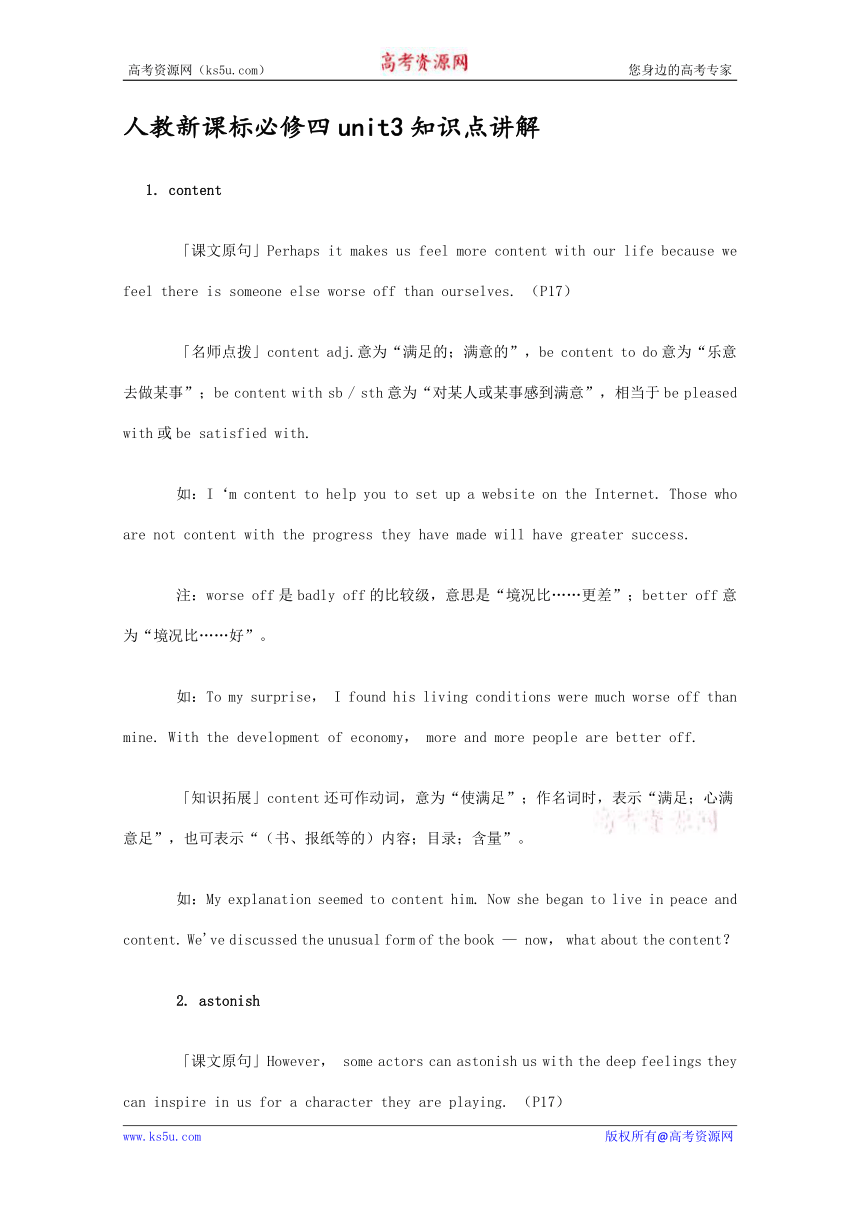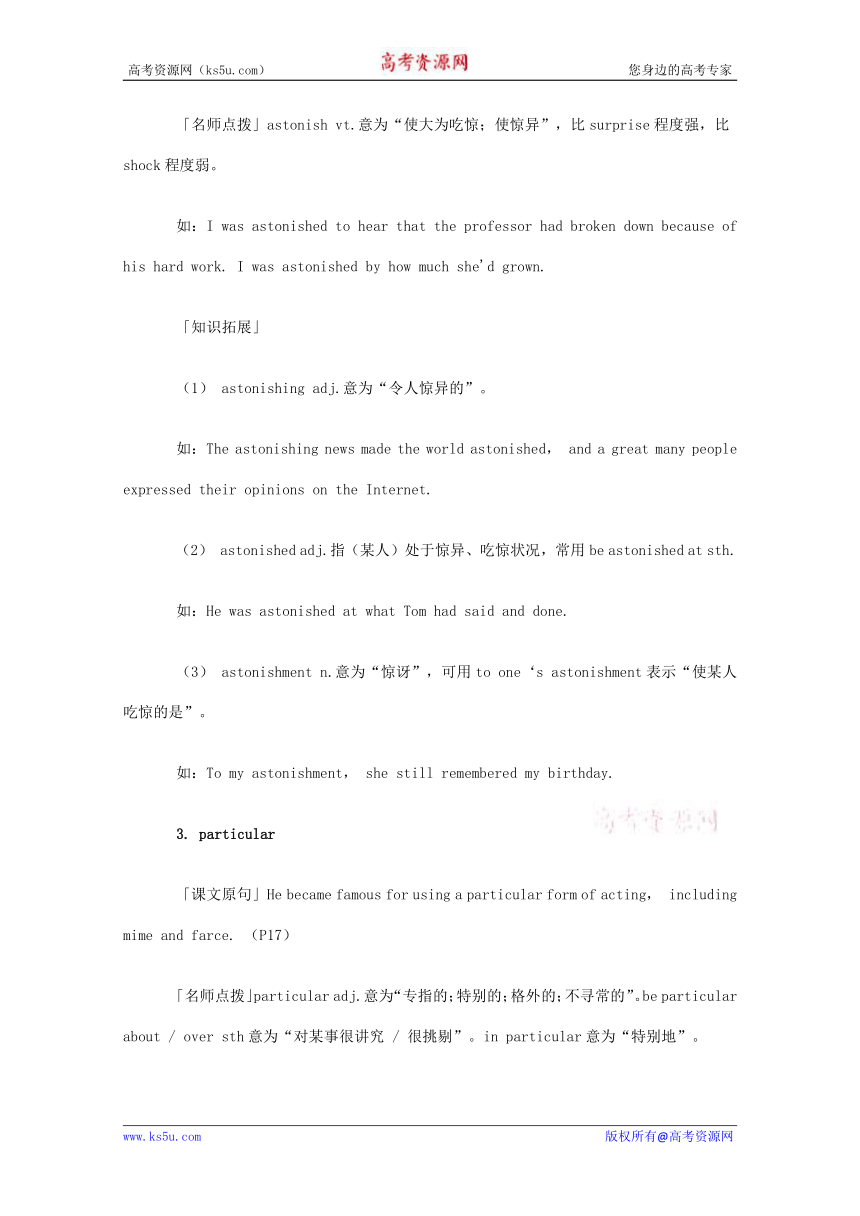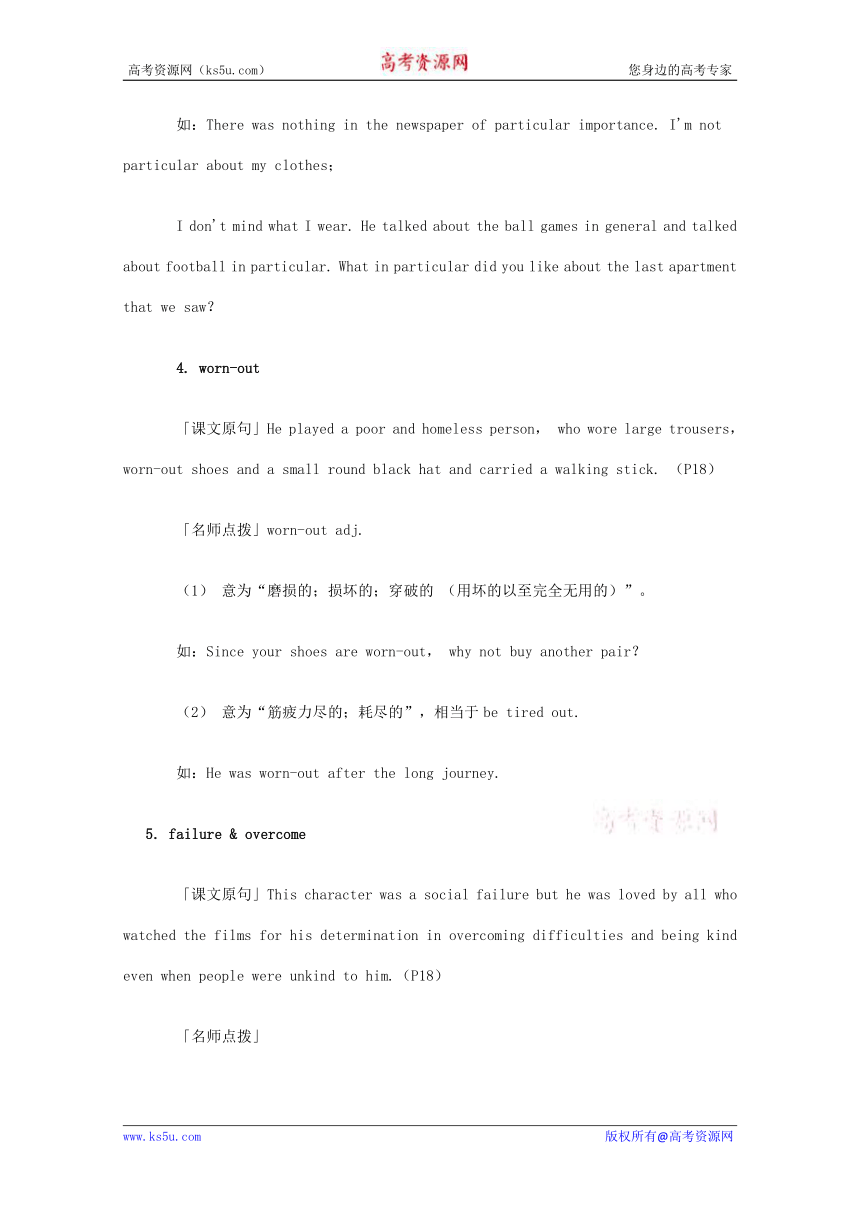Unit 3 A taste of English humour 知识点讲解
文档属性
| 名称 | Unit 3 A taste of English humour 知识点讲解 |  | |
| 格式 | rar | ||
| 文件大小 | 52.7KB | ||
| 资源类型 | 教案 | ||
| 版本资源 | 人教版(新课程标准) | ||
| 科目 | 英语 | ||
| 更新时间 | 2010-06-13 13:18:00 | ||
图片预览



文档简介
高考资源网() 您身边的高考专家
人教新课标必修四unit3知识点讲解版权所有:高考资源网(www.k s 5 u.com)
1. content
「课文原句」Perhaps it makes us feel more content with our life because we feel there is someone else worse off than ourselves. (P17)
「名师点拨」content adj.意为“满足的;满意的”,be content to do意为“乐意去做某事”;be content with sb / sth意为“对某人或某事感到满意”,相当于be pleased with或be satisfied with.
如:I‘m content to help you to set up a website on the Internet. Those who are not content with the progress they have made will have greater success.
注:worse off是badly off的比较级,意思是“境况比……更差”;better off意为“境况比……好”。
如:To my surprise, I found his living conditions were much worse off than mine. With the development of economy, more and more people are better off.
「知识拓展」content还可作动词,意为“使满足”;作名词时,表示“满足;心满意足”,也可表示“(书、报纸等的)内容;目录;含量”。
如:My explanation seemed to content him. Now she began to live in peace and content. We've discussed the unusual form of the book — now, what about the content?
2. astonish
「课文原句」However, some actors can astonish us with the deep feelings they can inspire in us for a character they are playing. (P17)
「名师点拨」astonish vt.意为“使大为吃惊;使惊异”,比surprise程度强,比shock程度弱。
如:I was astonished to hear that the professor had broken down because of his hard work. I was astonished by how much she'd grown.
「知识拓展」
(1) astonishing adj.意为“令人惊异的”。
如:The astonishing news made the world astonished, and a great many people expressed their opinions on the Internet.
(2) astonished adj.指(某人)处于惊异、吃惊状况,常用be astonished at sth.
如:He was astonished at what Tom had said and done.
(3) astonishment n.意为“惊讶”,可用to one‘s astonishment表示“使某人吃惊的是”。
如:To my astonishment, she still remembered my birthday.
3. particular
「课文原句」He became famous for using a particular form of acting, including mime and farce. (P17)
「名师点拨」particular adj.意为“专指的;特别的;格外的;不寻常的”。be particular about / over sth意为“对某事很讲究 / 很挑剔”。in particular意为“特别地”。
如:There was nothing in the newspaper of particular importance. I'm not particular about my clothes;
I don't mind what I wear. He talked about the ball games in general and talked about football in particular. What in particular did you like about the last apartment that we saw?
4. worn-out
「课文原句」He played a poor and homeless person, who wore large trousers, worn-out shoes and a small round black hat and carried a walking stick. (P18)
「名师点拨」worn-out adj.
(1) 意为“磨损的;损坏的;穿破的 (用坏的以至完全无用的)”。
如:Since your shoes are worn-out, why not buy another pair?
(2) 意为“筋疲力尽的;耗尽的”,相当于be tired out.
如:He was worn-out after the long journey.
5. failure & overcome
「课文原句」This character was a social failure but he was loved by all who watched the films for his determination in overcoming difficulties and being kind even when people were unkind to him.(P18)
「名师点拨」
(1) failure意为“失败”时,是不可数名词;意为“失败者;失败的事”时,是可数名词。
如:As we all know, failure is the mother of success. At last, he was a great success, while she was a failure. To our disappointment, the party turned out to be a failure.
(2) overcome v.意为“控制(感情);克服(困难);征服;战胜”,可用于to overcome difficulties / obstacles / problems / resistance等。
如:He made great efforts to overcome the difficulty. They succeeded to overcome the tallest mountain in the world.
「知识拓展」fail还可作动词,意为“失败;不及格;无法做到”,可用fail to do sth或者fail in doing sth.如:I failed to persuade him to give up smoking. = I failed in persuading him to give up smoking.
6. in search of
「课文原句」The film is set in California in the middle of the nineteenth century when gold was discovered and thousands of people rushed there in search of it. (P18)
「名师点拨」in search of意为“寻找”。类似的词组有:in the/a/one‘s search for/of,make a search for/of,在这三个短语中search是名词。
如:Today, many countryside people have rush to the city in search of good jobs. The researchers are in their search for the animals which they want to experiment with.注意:in search of 中of不可换用for.
「知识拓展」search还可以是作动词,意为“搜寻”,search 的宾语是寻找的东西所在的处所,即search someplace for sth,意为“搜查某地找……”。
如:They searched the building for the robber. He searched his pockets for some change.
而search sb for sth意为“搜某人身以找到某物”。
如:He searched the boy for the lost pen.
search after/for = look for = hunt for意为“到处寻找”。
如:People who are searching after inner peace sometimes turn to religion.
7. pick up
「课文原句」They wash sand from the river in a pan of water, and expect to pick up gold, but they have been not fortunate enough to find any. (P18)
「名师点拨」pick up意为“拾起;拿起”。
如:He picked up his hat and went out.
pick up还有其他意思:
(1) 在中途搭载承载(乘客、货物等)。
如:The bus stopped to pick up passengers.
(2) (偶然地)发现,得到,购买;学得,得到(知识、利益)。
如:I picked up the book in a lonely place. She picked up French very quickly in France. When you live in a country, you soon pick up the language.
(3) 恢复,使恢复。
如:I believe he will pick up by the seaside.
(4) 接收,收听(广播)。
如:It is easy to pick up the programme clearly through my radio.
「知识拓展」pick out意为“选好;选出;认出;看清楚”。
如:Have you picked out the movie you want to see?
Can you pick out your brother out from that group of people?
8. cut off
「课文原句Then he cuts off the leather top of the shoe, treating it as if it were the finest meat.(P18)
「名师点拨」
cut off意为“切下来;剪下来”。
如:He cut off piece of cloth and wrapped the wound.
cut off还可译为“切断;停掉;使电话中断”。
如:They‘ve cut off the water temporarily because they are repairing one of the main pipes. It was dangerous that our food and water supply were cut off at that time. We were cut off in the middle of our telephone conversation. Because I failed to pay the telephone bill, the telephone operator cut us off.
PAGE
www. 版权所有@高考资源网
人教新课标必修四unit3知识点讲解版权所有:高考资源网(www.k s 5 u.com)
1. content
「课文原句」Perhaps it makes us feel more content with our life because we feel there is someone else worse off than ourselves. (P17)
「名师点拨」content adj.意为“满足的;满意的”,be content to do意为“乐意去做某事”;be content with sb / sth意为“对某人或某事感到满意”,相当于be pleased with或be satisfied with.
如:I‘m content to help you to set up a website on the Internet. Those who are not content with the progress they have made will have greater success.
注:worse off是badly off的比较级,意思是“境况比……更差”;better off意为“境况比……好”。
如:To my surprise, I found his living conditions were much worse off than mine. With the development of economy, more and more people are better off.
「知识拓展」content还可作动词,意为“使满足”;作名词时,表示“满足;心满意足”,也可表示“(书、报纸等的)内容;目录;含量”。
如:My explanation seemed to content him. Now she began to live in peace and content. We've discussed the unusual form of the book — now, what about the content?
2. astonish
「课文原句」However, some actors can astonish us with the deep feelings they can inspire in us for a character they are playing. (P17)
「名师点拨」astonish vt.意为“使大为吃惊;使惊异”,比surprise程度强,比shock程度弱。
如:I was astonished to hear that the professor had broken down because of his hard work. I was astonished by how much she'd grown.
「知识拓展」
(1) astonishing adj.意为“令人惊异的”。
如:The astonishing news made the world astonished, and a great many people expressed their opinions on the Internet.
(2) astonished adj.指(某人)处于惊异、吃惊状况,常用be astonished at sth.
如:He was astonished at what Tom had said and done.
(3) astonishment n.意为“惊讶”,可用to one‘s astonishment表示“使某人吃惊的是”。
如:To my astonishment, she still remembered my birthday.
3. particular
「课文原句」He became famous for using a particular form of acting, including mime and farce. (P17)
「名师点拨」particular adj.意为“专指的;特别的;格外的;不寻常的”。be particular about / over sth意为“对某事很讲究 / 很挑剔”。in particular意为“特别地”。
如:There was nothing in the newspaper of particular importance. I'm not particular about my clothes;
I don't mind what I wear. He talked about the ball games in general and talked about football in particular. What in particular did you like about the last apartment that we saw?
4. worn-out
「课文原句」He played a poor and homeless person, who wore large trousers, worn-out shoes and a small round black hat and carried a walking stick. (P18)
「名师点拨」worn-out adj.
(1) 意为“磨损的;损坏的;穿破的 (用坏的以至完全无用的)”。
如:Since your shoes are worn-out, why not buy another pair?
(2) 意为“筋疲力尽的;耗尽的”,相当于be tired out.
如:He was worn-out after the long journey.
5. failure & overcome
「课文原句」This character was a social failure but he was loved by all who watched the films for his determination in overcoming difficulties and being kind even when people were unkind to him.(P18)
「名师点拨」
(1) failure意为“失败”时,是不可数名词;意为“失败者;失败的事”时,是可数名词。
如:As we all know, failure is the mother of success. At last, he was a great success, while she was a failure. To our disappointment, the party turned out to be a failure.
(2) overcome v.意为“控制(感情);克服(困难);征服;战胜”,可用于to overcome difficulties / obstacles / problems / resistance等。
如:He made great efforts to overcome the difficulty. They succeeded to overcome the tallest mountain in the world.
「知识拓展」fail还可作动词,意为“失败;不及格;无法做到”,可用fail to do sth或者fail in doing sth.如:I failed to persuade him to give up smoking. = I failed in persuading him to give up smoking.
6. in search of
「课文原句」The film is set in California in the middle of the nineteenth century when gold was discovered and thousands of people rushed there in search of it. (P18)
「名师点拨」in search of意为“寻找”。类似的词组有:in the/a/one‘s search for/of,make a search for/of,在这三个短语中search是名词。
如:Today, many countryside people have rush to the city in search of good jobs. The researchers are in their search for the animals which they want to experiment with.注意:in search of 中of不可换用for.
「知识拓展」search还可以是作动词,意为“搜寻”,search 的宾语是寻找的东西所在的处所,即search someplace for sth,意为“搜查某地找……”。
如:They searched the building for the robber. He searched his pockets for some change.
而search sb for sth意为“搜某人身以找到某物”。
如:He searched the boy for the lost pen.
search after/for = look for = hunt for意为“到处寻找”。
如:People who are searching after inner peace sometimes turn to religion.
7. pick up
「课文原句」They wash sand from the river in a pan of water, and expect to pick up gold, but they have been not fortunate enough to find any. (P18)
「名师点拨」pick up意为“拾起;拿起”。
如:He picked up his hat and went out.
pick up还有其他意思:
(1) 在中途搭载承载(乘客、货物等)。
如:The bus stopped to pick up passengers.
(2) (偶然地)发现,得到,购买;学得,得到(知识、利益)。
如:I picked up the book in a lonely place. She picked up French very quickly in France. When you live in a country, you soon pick up the language.
(3) 恢复,使恢复。
如:I believe he will pick up by the seaside.
(4) 接收,收听(广播)。
如:It is easy to pick up the programme clearly through my radio.
「知识拓展」pick out意为“选好;选出;认出;看清楚”。
如:Have you picked out the movie you want to see?
Can you pick out your brother out from that group of people?
8. cut off
「课文原句Then he cuts off the leather top of the shoe, treating it as if it were the finest meat.(P18)
「名师点拨」
cut off意为“切下来;剪下来”。
如:He cut off piece of cloth and wrapped the wound.
cut off还可译为“切断;停掉;使电话中断”。
如:They‘ve cut off the water temporarily because they are repairing one of the main pipes. It was dangerous that our food and water supply were cut off at that time. We were cut off in the middle of our telephone conversation. Because I failed to pay the telephone bill, the telephone operator cut us off.
PAGE
www. 版权所有@高考资源网
同课章节目录
